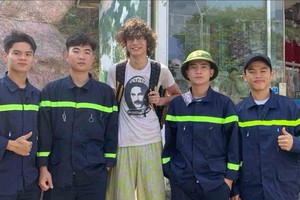Residents in the central province of Khanh Hoa say the Hyundai Vinashin Shipyard Co. (HVS) is surreptitiously using toxic copper slag to build and repair ships at night, despite warnings from the Ministry of Natural Resources and Environment (MoNRE) to stop.

A recent 20,000-ton import of the hazardous substance, known as nix grain, was not to be used by HVS until the company built a plant to treat previously produced waste, as directed by the MoNRE.
Nguyen Duong, deputy chairman-cum-party secretary of the province’s Ninh Phuoc and Ninh Yen communes, said residents had learned that HVS asked workers to use the imported nix at night to avoid detection.
Tu Ke Son, deputy head of the Vietnam Environment Administration (VEA), a division of MoNRE, said the Vietnam-Korea joint venture must come up with an effective solution to treat an initial 800,000 tons of nix it had earlier produced itself, and only then would it be allowed to use the imported slag.
VEA also told HVS to use safer technology instead of nix grain to reduce pollution.
Nguyen Van Son, a longtime resident of Ninh Yen Commune, said the community is now heavily polluted with nix dust. Locals were concerned about their health, and especially those who suffered respiratory diseases, rhinitis and children with asthma.
Water wells are also covered with piles of nix dust, which experts say could lead to cancer if consumed over a long period.
A plan for veterans to breed fish in the communes was halted, meanwhile, after the fish were found smelling of oil and with their intestines full of nix grain.
Related article:
Residents worry over HVS dumping of toxic slag
























